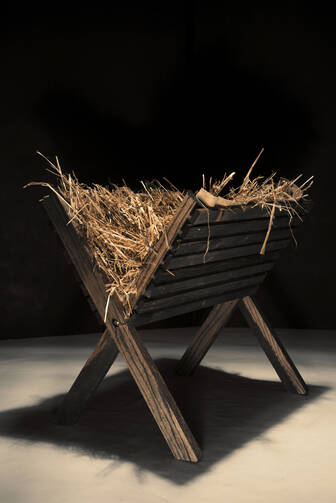One of the most moving moments of Pope Francis’ recent trip to Eastern and Central Africa was also one of the most historic. To inaugurate the Jubilee of Mercy, the pope decided that he would open the main holy door not in Rome, as popes have always done, but in Bangui, the capital of the Central African Republic. “Today Bangui becomes the spiritual capital of the world,” he said. On that day the attention of the church and much of the world was focused not on a celebrated Roman basilica but on a lesser-known church in a poor, war-torn country. It exemplified the pope’s desire for the church to go to the margins.
It was also a powerful reminder, particularly since Pope Francis made this gesture on the First Sunday of Advent, of when and where God chose to enter our world—not in a time of peace or in a region devoid of conflict but in an occupied country that was riven by internecine violence. As John Dominic Crossan points out in The Historical Jesus, Tacitus’s well-known description of first-century Palestine, Sub Tiberio quies (“Under Tiberias all was quiet”) was not meant to paint a portrait of a peaceful land. Rather, it referred to the Roman legions’ practice of brutally and savagely subduing any opposition or rebellion from an oppressed Jewish people. And, as Professor Crossan points out in an aside, these reprisals were usually carried out by Roman legions based in Syria.
It is, sadly, too easy to draw parallels to contemporary situations. God’s world is still plagued by violence, in regions too numerous to mention. Syria itself is again a place of warfare, and the resulting refugee crisis has become one of the worst in the modern era. And what should be a heart-rending tale of men, women and children seeking homes has drawn utterly heartless comments from some American political leaders. Christian legislators should remember that the Holy Family are depicted as refugees during their flight into Egypt (Mt 2:13-23). Like refugees today, they were fleeing violence, in their time from the tyrant Herod. As do so many of the war-battered today, the Holy Family lived in a time of danger and uncertainty.
Indeed, the entire Christmas story is replete with individuals facing uncertainty. To begin with, Mary’s first words to the angel Gabriel are a question, “How can this be?” Her pregnancy prompted Joseph, who was probably burdened with doubts, to consider divorcing his betrothed, something he was within his rights to do, until a dream calmed him. And Mary’s subsequent visit to her kinswoman Elizabeth can be seen not only as a reflection of the desire to proclaim the great news of the birth of the Messiah but, more simply, as a young woman seeking counsel from an older woman in a world of uncertainty.
The when and where, however, is only part of the story of God entering our world. The how is important as well. “Not as a monarch, but a child,” as the Christmas hymn has it. We may be so used to thinking about the familiar Christmas story that we forget that God could have entered the world in any way that God wished. But God chose to enter into the human family that lived in a small, backwater town under Roman rule. Moreover, God came to us in the most vulnerable and defenseless way possible—as a child utterly reliant on Mary and Joseph for care. God depended on us completely. Such vulnerability would also be an essential part of Jesus’ life and ministry. And what is needed in the movement toward peace is a greater willingness to be vulnerable.
The opposite of this vulnerability is a fear that masks itself in defensiveness. Certainly some defense is necessary, but when taken to the extreme—nations perpetually arming for battle, terrorist groups waging campaigns of death, countries closing their borders to refugees—it shuts down opportunity for dialogue, reconciliation and peace. Herod was presented with the Messiah, but fear prevented him from listening. Similarly, fear prevents us from listening today to people most in need. If perfect love drives out fear, as St. Paul said, perfect fear drives out love.
The pope’s visit to Africa shows the kind of vulnerability needed. He was willing to take risks. First, there were the risks of failure: one of his visits was to an ecumenical group in the C.A.R., which could have degenerated into another dull meeting. More important, he spoke to people at a mosque in an extremely dangerous area where Muslims had been isolated and under siege by Christian militias. He could have been killed. But in both cases, he was willing to risk being vulnerable and even defenseless.
The point is not that Pope Francis is the apotheosis of peace. Rather, he reminds us of the way Jesus asks us to work for peace: completely, totally, wholeheartedly. Only by being willing to take risks, to reach out, to drop our guard and enter the world with vulnerability will we be worthy of the call of the Prince of Peace.








